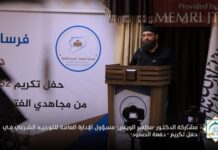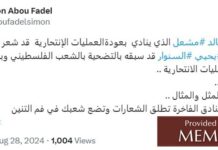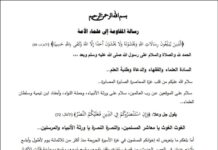Według doniesień w mediach zachodnich Wielka Brytania, Francja i NIemcy zgadzają się z prezydentem USA, Donaldem Trumpem, że irański program pocisków balistycznych i ekspansja Iranu w regionie stanowią zagrożenie dla region i jego bezpieczeństwa i stabilności[1].
Do chwili obecnej Iran stanowczo odrzuca zachodnie żądania dyskusji o jego programie pocisków balistycznych, stwierdzając, że program jest do samoobrony – mimo faktu, że zasięg pocisków 2000 km jest uznany przez społeczność międzynarodową za projekt do celów ofensywnych. Jeśli chodzi o pociski o mniejszym zasięgu, Iran zaprzecza jakiemukolwiek udziałowi w zaopatrywaniu w takie pociski rebeliantów Houti w Jemenie; jeśli chodzi o jego ekspansję w regionie, twierdzi, że jego obecność w Syrii, Iraku i Libanie ma na celu chronienie jego granic przed zagrożeniem ze strony Państwa Islamskiego (ISIS).
30 kwietnia 2018 r. zastępca dowódcy Korpusu Strażników Rewolucji Islamskiej (IRGC), generał Hossein Salami, powtórzył to podczas ceremonii z okazji Narodowego Dnia Zatoki Perskiej w Iranie: „Podczas gdy wrogowie grożą nam i żądają, byśmy się rozbroili, ich żądanie jest niemoralne, nielogiczne i ambitne. Pociski są [naszym] kapitałem defensywnym i jednym z głównych filarów naszej potęgi odstraszania. Nigdy nie zgodzimy się na rezygnację z naszego potencjały obronnego”[2]. Następnie powiedział: „Europejczycy muszą wiedzieć, że chociaż są na nas nałożone sankcje, nigdy nie rozbroimy się i nie stracimy podstaw naszej potęgi. To my zabezpieczamy dla nich energię i nie wolno im igrać z naszą potęgą. Iran jest zdolny do obrony swoich interesów na każdym punkcie. Nie musimy [już] iść daleko, by osiągnąć wielkie wyżyny. Uczyniliśmy naszą potęgę w zasadzie odporną na szkody”[3].
W oświadczeniu opublikowanym kilka dni po wizycie francuskiego ministra spraw zagranicznych, Jean-Yves Le Driana w Iranie na początku marca 2018 r. najwyższy przywódca irański, Ali Chamenei i dowódcy IRGC odrzucili francuskie żądania dyskusji o irańskich pociskach i ekspansji[4].
Należy zauważyć, że pośrodku konfliktu Iranu z Zachodem o żądania dotyczące irańskich pocisków i mimo twierdzeń reżimu irańskiego, że te pociski są do celów obronnych, Hossein Dalirian, dyrektor działu wojskowego agencji informacyjnej Tasnim, która jest bliska IRGC, nie wahał się tweetować 21 marca 2018 r. zdjęcia pocisków na wystawie IRGC w mieście Ahwaz z okazji perskiego Nowego Roku, z których jeden miał napis: „Izrael musi być wymazany [z mapy]” po hebrajsku i po persku (patrz poniżej).
Jest także godne uwagi, że w odpowiedziach w sprawie pocisków irańscy oficjele wielokrotnie podkreślali porozumienie osiągnięte podobno podczas negocjacji JCPOA z administracją Obamy; zgodnie z tym porozumieniem Iran godzi się na ograniczenie projektu tylko do pocisków o zasięgu 2000 km, co nie zagraża Europie, ale obejmuje Izrael (patrz MEMRI Badania i analizy Nr 1298, https://www2.memri.org/polish/dowodca-irgc-dzafari-w-oswiadczeniu-ktore-mialo-uspokoic-europe-obecnie-zadowalamy-sie-pociskami-o-zasiegu-2000-km-zasiegu-ktory-pokrywa-sily-usa-w-regionie/9814, 2 lutego 2017).
Niniejsze opracowanie przedstawia główne punkty wypowiedzi irańskich oficjeli, odrzucających wszelkie żądania Zachodu w sprawie pocisków oraz w sprawie regionalnej ekspansji Iranu.
Ciąg dalszy opracowania nie jest spolszczony.
MEMRI has published a number of reports on statements by Iranian officials objecting to limits to Iran’s missile capability:
– MEMRI Special Dispatch No. 7191, Iranian Officials To Europe: Hands Off Our Ballistic Missiles – They’re Not Aimed At You, And Can Even Serve Your Security Needs, November 21, 2017.
– MEMRI Inquiry and Analysis No. 1357 IRGC Commander Jafari In Message Meant To Reassure Europe: Right Now, We Are Settling For Missiles With 2,000-Km Range – That Covers U.S. Forces In The Region, November 3, 2017.
– MEMRI Special Dispatch No. 6349, Iran Launches Long-Range Missiles Emblazoned With Slogan: 'Israel Should Be Wiped Off The Face Of The Earth,’ March 16, 2016.
Iranian Officials’ Statements Against European Demands On The Issues Of Its Missiles And Regional Expansion
As a rule, the Iranian political and military leadership maintains a uniform stand opposing in principle any discussions with Europe or with anyone else on the issues of its missiles and its expansion in the region.
Supreme Leader Khamenei To U.S. And Europe: „Why Should Talks Be Held With You? … Why Are You Yourselves Present In The Region?”
On March 8, 2018, Supreme Leader Ali Khamenei addressed the issue of American and European elements’ opposition to Iran’s presence in the Middle East, saying: „The American administration that creates fitna [strife] and spreads corruption asks us, Why are you present in the region? Well, do [we] have to obtain your permission to be present in the region? In order to be present in the region, we need to conduct negotiations and talks with the governments of the region. Why should [we] talk with you? When we want to be present in America, we will talk to you.
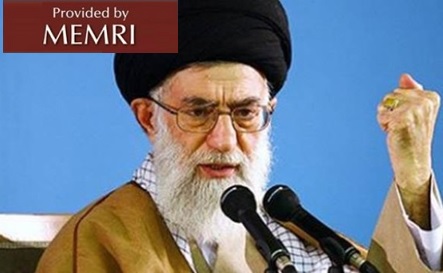 Khamenei (Source: Farsi.khamenei.ir/speech-content?id=39136, March 8, 2018)
Khamenei (Source: Farsi.khamenei.ir/speech-content?id=39136, March 8, 2018)
„The same goes for the countries of Europe, that say they want to talk with us about our presence in the region. What business is it of yours? Why are you yourselves present in the region? Is this our region, or yours? If it is ours, what are you doing here? This is our region, and we will talk with the peoples of the region or with the regimes of the region, and we will reach agreements. Thank God, we have already reached agreements, we have succeeded, and we have advanced. God willing, in the future we will advance even more.”[5]
Deputy IRGC Commander Salami: „Our Defensive Capabilities Cannot Be Stopped Or Curbed”
In a March 7, 2018 speech at an exhibition of the IRGC’s industrial achievements, Deputy IRGC commander Gen. Hossein Salami said: „With regard to the recent positions of some of the Western officials in the matter of our military and missile capability – our defensive capabilities cannot be stopped or curbed. No country can control the might of Iran’s defense… There will be no negotiations on or halting of our defensive capability.
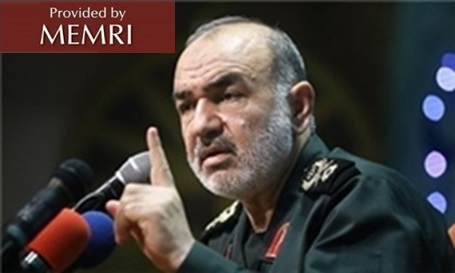 Salami (Source: Fars, March 7, 2018)
Salami (Source: Fars, March 7, 2018)
„The relations that other countries and hostile superpowers can hold with us can only [involve] their recognition of the fact that Iran is emerging as a superpower, with reason and a reputation on the deterrent level… We have reached the point where it is not possible to curb the expansion of science and new technologies, or of [our] defense.”[6]
IRGC Aerospace and Missile Force Commander Hajizadeh: „The World Of Arrogance [i.e. the U.S.]… Can Do Nothing” Against Us
In a speech at the Festival of the Soldier, which took place at IRGC headquarters on March 7, 2018, IRGC Aerospace and Missile Force commander Brig.-Gen. Amir Ali Hajizadeh said: „Every day, the Americans enlarge their weapons stores – [yet] they say that we should not have missiles to defend our interests… The world of today is a world of might… Despite the enemies and the steps taken by the arrogance [i.e. the U.S.], more and more [Iranian elements] support expanding Iran’s defense. The government, the Majlis, and everyone, including everyone, are unanimous and active on the issue of [our] missiles, particularly surface-to-surface missiles. Once, we had to give extensive explanations to the institutions regarding our steps; now, this is no longer the situation, and our production [of missiles] has increased threefold.
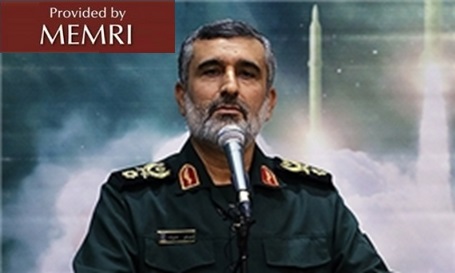 Hajizadeh (Source: Fars, March 7, 2018)
Hajizadeh (Source: Fars, March 7, 2018)
„We must not accept the news about ourselves that is [published by] the media of the enemy. They oppose the unity of our people, and are hostile to them; they publish rumors – for example, that this earthquake is a result of IRGC missile tests… The world of arrogance [i.e. the U.S.] is establishing a front against us, but you must know that they can do nothing [against us].”[7]
Kayhan: „The Regional Negotiations Are Aimed At Cancelling Iran’s Military Might ”
On March 10, 2018, the Kayhan daily, which is close to the IRGC, warned about „the dialogue between Iranian Foreign Ministry elements and Western elements in England, France, and Germany,” noting that „the aim of American and Europe in these talks is to expel Iran from the region and besiege it within its geographical borders.” He added: „The result of this aim is for 'little Iran’ [i.e. within its national borders] to rapidly deteriorate and collapse…
„In effect, it can be said that the first result of regional negotiations will be a grave weakening of our security status, not only regionally but also domestically, because after that, 'little Iran’ will be easily attacked by Saudi Arabia, the Zionist regime, America, and Europe, who are deeply hostile to it…
„When Iran is stripped of its might, the effectiveness of its giant missiles will drop to that of a bow and arrow, and won’t worry a soul. In these talks, America and Europe are emphasizing Iran’s security status, not with regard to the missiles, but with regard to the region. That is, if Iran has no [regional] influence, ISIS and Al-Nusra [i.e. Al-Qaeda] elements will fall upon its borders from the west and from the east, and will disrupt the situation within the country. Everyone knows that in such a situation missiles can do nothing – because missiles are not a weapon for [fighting on] the city level. Therefore, the regional negotiations are aimed at cancelling Iran’s military might…
„In these talks, the other side wants to turn Iran into an ordinary state… that is, to bring it back to an age when it had no independence in any matter whatsoever and its 'national interests’ were completely insignificant.
„Assuming this happens, after Iran backs down from its regional might, will America, Europe, and their ilk allow it to act normally and like any other country with regard to its economic matters and so on? Libya [that willingly gave up its nuclear project] is an instructive example right in front of our eyes…
„Of course, the 'little Iran’ project will not be realized, because a great people is willing to give its life for the greatness of its country. Likewise, even the 'surrendering to the West’ project will not bear fruit, because even if some [i.e. members of the government of Iranian President Hassan Rohani] have agreed to this in private meetings, millions of Iranians are willing to cancel such agreements and promises.
„This [Iranian Islamic] revolution cannot be imprisoned [within the borders of Iran], because it meets the most important needs of the peoples of the region – honor, independence, freedom, and religion. Even the people in Iraq want mighty Iran to support their security and honor. This is true as well for the people in Syria, Yemen, Afghanistan, Pakistan, and so on. The people of the region do not want America the occupier, Israel the aggressor, and Saudi Arabia the repressor. They see no benefit to their presence – while for centuries the people in the region have seen only cooperation and benefit from Iran and the Iranian [people]. Therefore, we do not want to lose our uniqueness [and join] the list of America the occupier and so on. So don’t bother [trying to convince us to do so].”[8]
Majlis National Security Committee Member Falahat-Pisheh: We Should „Begin Serious Security Talks With Europe… [So] That The Europeans Actually Become The Defenders Of Iran’s Missile Program”
An unusual position on the missiles issue was expressed by Majlis National Security Committee member Hashmatollah Falahat-Pisheh, who in a March 27, 2018 interview with the IRNA news agency called on the Iranian leadership „to begin serious security talks with Europe” with the aim of persuading the Europeans that Iran’s missile strength could serve Europe’s security against ISIS (notwithstanding the fact that it is not clear how ISIS in the Middle East is threatening Europe). Thus, he said, Europe would end up defending Iran’s missile project, just as it was defending Iran’s nuclear program with the JCPOA. He clarified:
„Iran is not considered a threat to Europe’s security, and it has always taken the Europeans’ security concerns seriously… For example, in 2001 the Islamic Republic of Iran announced officially and unilaterally that it would cancel its Shihab-4 missile project in order to allay the European countries’ fears. The Shihab-4 missiles have a range of over 2,000 km. In effect, since then, Iran has not [used] missiles with a range of over 2,000 km.
„If we start security talks with the Europeans, we will at the same time reach the conclusion that the Europeans’ security [needs] are very similar to our own when it comes to issues like ISIS – because without Iran, ISIS would have reached the gates of Europe. We can act in such a way that the Europeans actually become the defenders of Iran’s missile program, [because the Iranian] missiles will ward off the expansion of the threat against the West.”[9]
Following The Tripartite Western Attack In Syria, Iranian Regime Continues To Refuse To Meet Any Western Demands Regarding Its Missiles
Following the April 14, 2018 U.S.-British-French attack in Syria in response to the Syrian regime’s use of chemical weapons against its citizens, the Kayhan daily, a mouthpiece of the Iranian regime, headlined a front-page article: „[There Is A] Crucial Need To Increase Iran’s Missile Capabilities – This Is The Lesson Of The Western Attack In Syria.” Laying out the regime’s conclusions from the attack, the article stated: „The missile strikes by America, England, and France against several parts of Syria early this Saturday were worthless, and yielded no military or political achievements [for the West]. However, the fact that they were carried out is significant [and clarified something to us]. Had Syria possessed sufficient missile capabilities, would America have dared to lash out [against it] so pointlessly?… Clearly, if Syria had Iran’s missile capabilities, America and its allies would never have dared to carry out such a bold attack on such a flimsy, mendacious pretext…
„If Iran stops increasing its missile capability, no other means, including talks and diplomacy, will be able to prepare the ground for mitigating the tension and sensitivity over Iran’s military might. Not only that, but doing so will expose Iran to possible attacks by its regional and foreign enemies… We must have missiles, and lots of them. They must be developed and displayed to the enemy. That is the cheapest way to deterrence.”[10]
Exhibition Of Iranian Missiles Marked „Israel Must Be Wiped Off [The Map]” In Hebrew And Persian
On the Persian New Year, March 21, 2018, Hossein Dalirian, director of the military desk of the Tasnim news agency, which is close to the IRGC, tweeted, in Persian and English, photos from a missile exhibition held by the IRGC in the city of Ahwaz. One photo showed a Zolfaghar missile, whose range is 650-700 km, marked in Hebrew and Persian „Israel must be wiped off [the map].”
The Persian tweet stated: „The IRGC held a missile exhibition in Ahwaz. One of the Zolfaghar missiles bore a message in Persian and Hebrew: 'Israel must be wiped off’ the map.” His tweet in English read: „#BREAKING: #IRGC is holding a missile exhibition in #Iran’s Ahvaz city, displaying a Zolfaghar missile marked with the phrase '#Israel must be wiped off the map.'”
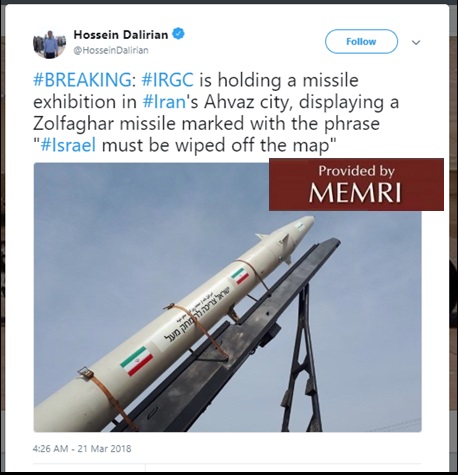 Dalirian’s tweet of Zolfaghar missile in English. (Source: Twitter.com/HosseinDalirian/status/976419840994037760, March 21, 2018)
Dalirian’s tweet of Zolfaghar missile in English. (Source: Twitter.com/HosseinDalirian/status/976419840994037760, March 21, 2018)
In another series of tweets the same day, Dalirian called the Khorramshahr ballistic missile, unveiled September 22, 2018 in an armed forces parade marking the anniversary of the Iran-Iraq (1980-88) war, Iran’s most important military achievement of the year.
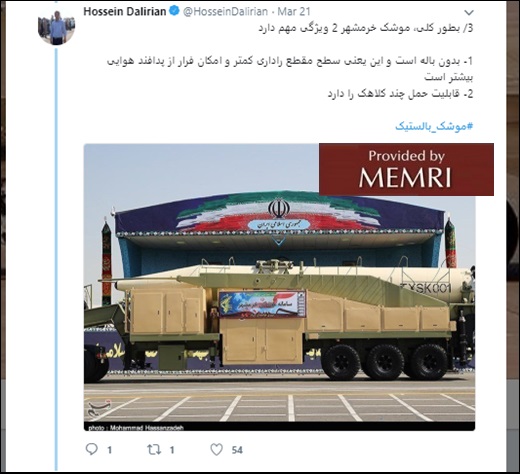 Dalirian’s tweet of Khorramshahr ballistic missile (Source: Twitter.com/HosseinDalirian/status/976395406740459520, March 21, 2018)
Dalirian’s tweet of Khorramshahr ballistic missile (Source: Twitter.com/HosseinDalirian/status/976395406740459520, March 21, 2018)
In his tweets, Dalirian noted that a look at the missile shows that Iran has successfully produced its second missile controlled by fins, and its third with a 2,000-km range – the previous ones being the Sajil (1 and 2) and the Ghadr F ballistic missiles.[11] He explained that two of the Khorramshahr’s unique features are its lack of fins (sic), so it is less visible to radar and other air defenses, and its ability to carry several warheads at once – making it the first product of its type in the family of missiles capable of highly effective and sensitive operations. He added that according to IRGC Aerospace and Missile Force commander Hajizadeh, the Khorramshahr missile weighs 1,800 kg. If it carries three warheads, each weighing 600 kg, it is the equivalent of three other warhead-equipped Iranian 2,000-km range missiles, i.e. a Sajil or a Ghadr – thus saving on the costs of launching, maintenance, preparation, and so on.[12]
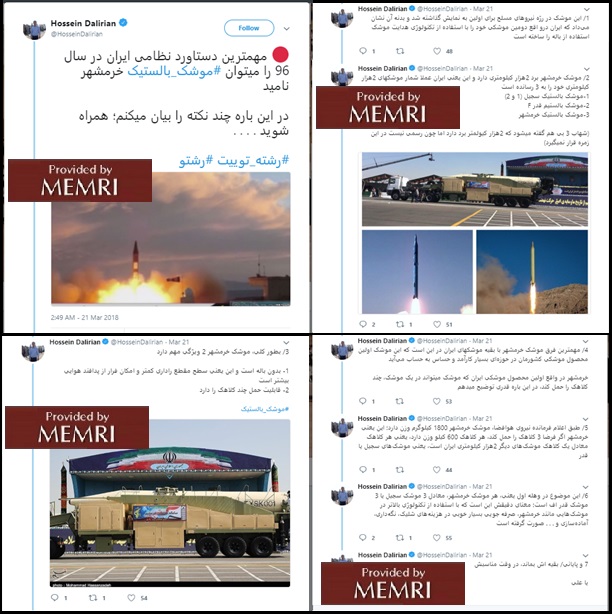 Dalirian’s tweets describing the Khorramshahr missile and its features (Source: Twitter.com/HosseinDalirian/status/976395406740459520, March 21, 2018)
Dalirian’s tweets describing the Khorramshahr missile and its features (Source: Twitter.com/HosseinDalirian/status/976395406740459520, March 21, 2018)
* U. Kafash is a Research Fellow at MEMRI; A. Savyon is Director of the MEMRI Iran Media Project.
[1] It should be noted that the Trump administration has recently been emphasizing not only the danger of Iran’s 2,000-km-range missiles, but also the danger of its 300-500-km-range missiles, because Iran has been supplying them to the Houthi rebels in Yemen, and they have been firing them into Saudi territory almost daily.
[2] Tasnim (Iran), April 30, 2018.
[3] Tasnim (Iran), April 30, 2018.
[4] At the same time, as noted in this report, Majlis National Security Committee member Hashmatollah Falahat-Pisheh called to hold „serious security talks” with Europe in order to recruit its support by persuading it that Iran’s missile program helps to protect Europe from the threat of ISIS.
[5] Farsi.khamenei.ir/speech-content?id=39136, March 8, 2018.
[6] Fars (Iran), March 7, 2018.
[7] Fars (Iran), March 7, 2018.
[8] Kayhan (Iran), March 10, 2018.
[9] IRNA (Iran), March 27, 2018.
[10] Kayhan (Iran), April 16, 2018.
[11] It should be noted that the Shihab-3B also has a 2,000-km range, but the regime has not officially announced this.
[12] Twitter.com/HosseinDalirian, March 21, 2018.






